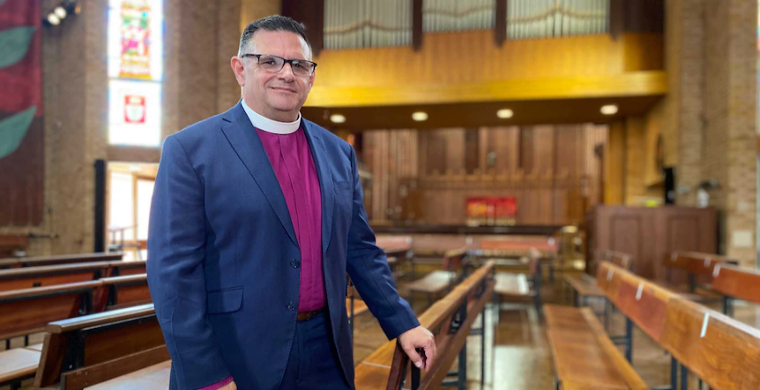AUSTRALIA: Anglican Church faces shortage of ministers, churches in the bush as it repays victims of child sexual abuse
Anglican Diocese of Bathurst Bishop Mark Calder leans against pew inside church Bathurst Bishop Mark Calder is fighting for the diocese to survive financial woes. (ABC Central West: Xanthe Gregory)
By Xanthe Gregory
https://www.abc.net.au/news/
March 10, 2021
The largest Anglican diocese in western New South Wales is suffering from a crippling shortage of ministers as it struggles to pay back the church's victims of child sexual abuse.
The Anglican Diocese of Bathurst, which covers a third of the state, is also selling churches to fulfil its reparations commitments under the National Redress Scheme.
In a bid to balance its books, the church is also asking new ministers to raise up to $30,000 to help run their churches before relocating out west.
Bishop Mark Calder said the church was at a crossroads between delivering services to remote communities and paying off its debt.
"We're feeling the impact, not only of past devastating sins, but of past poor planning, and failing to modernise the ministry overtime," Bishop Calder said.
He said the diocese was struggling in the face of past financial mismanagement, which had seen it go into $25 million of debt.
It still owes $2 million in reparations to victims of child sexual abuse.
"Our resources are now at an all-time low," Bishop Calder said.
Bishop Calder said without the promise of a full-time wage it was difficult to sell the idea of moving to western NSW to a new minister.
The Riverina, Bathurst and Armidale dioceses together represent the most rural and remote communities in the state.
Many of their ministers regularly travel several hundred kilometres to deliver services to small communities that do not have a full-time priest.
Gilgandra is one of 17 vacant parishes in the diocese.
Stuart Border owns the local post office there where he works full time, but every second Sunday he travels hundreds of kilometres to deliver services in Coonamble after its minister retired.
"It is our [lay minister's] responsibility to try and not let our churches just die or fade away," Mr Border said.
Mr Border said if he didn't step up, the church and fellowship would not survive.
"All it costs me is my fuel but we are all working towards a situation where we do have more clergy in our parishes," he said.
"It takes some time out of my leisure time but I really do enjoy it."
Over the past five years, the diocese has been forced to sell 25 churches between the Blue Mountains and Queensland border to fund payments through the National Redress Scheme.
One asset up for sale is the 175-year-old St Paul's Church in Carcoar.
The community will not let it go without a fight.
Late last year, the village -- home to 200 people -- set out to raise $450,000 in 90 days to purchase the church before it is put on the market.
McKenzie Graham coordinates the Save St. Paul's fundraising effort to raise money to buy back the historical Carcoar church.
The 21-year-old does not practice Christianity, but said the church was an invaluable asset and should remain in parishioner's hands despite the church's past wrongs.
"It's very frustrating to have to buy back something that the community has built and maintained for 175 years," Ms Graham said.
The Diocese of Bathurst will use the funds to redress victims abused by ministers within the diocese as recommended by the 2017 report from the Royal Commission into Institutional Responses to Child Sexual Abuse.
"We're a part of that redress scheme," she said.
"Everyone pays a price and we're righting the wrongs of the church."
The community has raised almost 90 per cent of the funds with less than two weeks remaining to buy the church.
"The sale of property hurts," Bathurst's Bishop Calder said.
"It causes heartache in those communities but nothing compared to the heartache of those who have been abused by the church in the past."
Anglican Diocese of the Riverina's Bishop Donald Kirk said the declining population in regional areas meant the church had less fundraising power.
This predicament had forced the church to do more with less.
"When you've got a small community that isn't viable enough itself to financially support a priest, then you've got to put that [congregation] together with other communities," Bishop Kirk said.
The result, he said, was fewer ministers.
But those that remained had to travel greater distances.
"No priest can manage their way through seven different towns and look after them all adequately," he said.
Bathurst Bishop Mark Calder said he wanted to relieve the pressure on ministers who were travelling to keep remote churches running.
This month he will set off on a recruitment tour of the eastern seaboard in a bid to recruit new clergy from Sydney, Melbourne and Brisbane to the bush.














